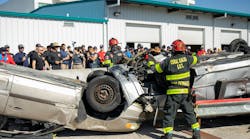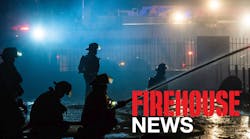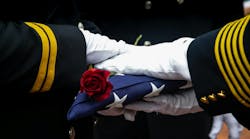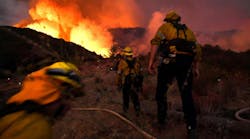Most fire departments use some type of interview process to select entry-level candidates. In fact, so much weight is put on the “oral” that it is not uncommon to see the interview accounting for 100% of a candidate’s overall score while the other phases of the exam are scored as “pass or fail.” Translated, candidates who meet the minimum score on the written and physical agility portions of the exam the move forward in the testing process. At this juncture all candidates are considered equal.
Because the interview is such an important component of the hiring process, one would expect this to be the area on which candidates concentrate most of their energy and effort, but this is not the case. Most candidates concentrate their efforts on getting as many certifications and fire science courses as possible. While these are certainly important, firefighters are hired based on their merits as members of the community and being people the fire department wants representing it for the next 30 years. A wise fire chief once said, “We hire for quality, we train for skill.” In other words, a fire department cannot train people to be of high moral fiber (hopefully, they learned that years ago), but it can train them to be firefighters.
One of the most challenging portions of the interview deals with situational questions. Often, there are no right or wrong answers to these questions. The oral board is simply trying to assess a candidate’s thought process. Other times, however, there are definite pitfalls set up to fail a candidate who answers a question in a certain way.
Traditionally, candidates learn how to handle situational questions by visiting fire stations and seeking the opinions of the firefighters. Unfortunately, it is difficult to get a consensus on complex situations. As a result, the candidate frequently leaves the station with more questions than answers. Even though this may be the case, it is imperative that people seeking firefighter positions visit fire stations and interview the firefighters.
Even if two firefighters disagree on how to handle a complex situation, the candidate will hear how each would handle a given situation. It would be up to the candidate to evaluate which philosophy he or she subscribes to and add it to his or her repertoire. At this point, the candidate has thought about the issue and is able to formulate an answer if asked to do so.
A negative aspect of visiting the fire station and getting coaching for the interview is the fact that most candidates memorize the answers without understanding the concepts behind the questions. A candidate who can parrot a desirable answer, but who does not understand the concept will be stumped if the board gives a different slant to the question. A candidate who understands the concept behind the question cannot be baffled by it.
As a fire captain for a large metropolitan fire department, I have been involved with my department’s entry-level interviews as well as hiring processes in numerous neighboring cities. I am constantly amazed at how poorly fire service candidates prepare for their interviews. These men and women all seem to have their hearts in the right place, but their delivery (and answers) all need work.
After proctoring hundreds of entry-level interviews and seeing first hand the strong need to educate candidates on the oral exam process, I spent the past year compiling a list of the most common entry-level interview questions. In this column, which is based on my book Smoke Your Firefighter Interview, the reader will find the most commonly asked fire department interview questions along with what I believe are the best answers. In addition to the initial questions and answers, I will provide follow-up questions (and answers) designed to look deeper into the core issues.
Perhaps the best part of each column will be the “reasoning” section found at the end of each question. This section will break down each question and explains why the examiners are looking for a particular answer. The reader will gain insight into fire department cultures as well as understand the rationale as to why we are looking for a particular response.
Situation questions were developed to determine how a candidate would react when faced with adversity. The six categories of questions can be broken to test how a candidate would react to the following:
Many candidates try to figure out what the board wants them to say instead of answering what they would really do. For example, you are asked what you would do in the following situation: You observe that the engineer who is backing up the rig has struck a car. As you approach, you see him rubbing out a small scratch. He looks up, sees you and tells you not to worry about it. You say to him that you feel it’s important for him to bring it to the captain’s attention. He explains that he has “been here for a long time” and that it is “just a junky old car.” He also tells you that “in the fire service we stick together” and asks you to “cover my back on this one.”
Many candidates are lulled into a false sense of security by the question. They are confused by the “brotherhood” of the fire service and are led to believe that firefighters are willing to lie for the good of a coworker. Nothing can be further from the truth. We don’t lie and cover up anything.
The best advice for answering situational questions is to try to determine how you would handle a given situation if you encountered it in your everyday life. Follow this line of questioning: You and a friend are having dinner at a restaurant. As you leave the parking lot, he backs up into another car. There is a small scratch that is barely visible. He tells you not to worry about it. What would you do and why?
This one is easy. You would tell your friend that he is nuts. There is no way you are willing to turn your back on the fact that he just damaged someone’s car. This the universal answer that everyone swears they would do. You would attempt to locate the owner or at minimum leave a note on the vehicle. You would never consider leaving the scene. That, of course, would be illegal. In fact, it would be considered a hit and run.
For some reason, however, when some candidates are faced with the same situation, but the other individual is wearing a firefighter’s uniform, they can be persuaded to do something that is immoral, unethical or illegal.
There are some common rules of thumb in dealing with moral issues. The most basic advice is to determine whether you are being asked to do something that is immoral. If so, or if the question makes you uncomfortable, it is imperative to do the right thing. The right thing is to step up and take a stand against the immoral action. Even though an action may not be illegal, it can still be immoral. If this is the case, the candidate is expected to intervene. Firefighters do not operate in a “gray area.” If an action is wrong, it is wrong. If there is even a perception that it may be wrong, it is wrong. Perception is reality.
It is important to maintain the dignity of the fire service. Firefighters are among the few people the public allow into their homes without giving a second thought to hiding or protecting their valuables. It is incumbent on all firefighters to protect and honor this privilege.
Ethical questions that you may face in an entry-level interview deal with actions that may not be illegal, but go against society’s rules or the cultural rules of the fire department. Ethical dilemmas are often tied to violations of departmental policies and procedures. If you consider for a moment why a policy or procedure was written, you will generally discover that it resulted from a firefighter or civilian injury, damage to equipment or an action that cost the fire department money.
If a candidate elects to violate a known policy because it seemed insignificant, he or she has set the tone for breaking additional policies. An astute rater will ask the candidate whether organizational policies are important. The candidate will undoubtedly nod his or her head yes. The rater will then say that since the candidate chose to violate this “insignificant” policy, how would he or she determine which policies to follow? In other words, where do you draw the line?
An organization cannot have members follow only the policies and procedures that they feel are important. The organization would become undisciplined and collapse. This is why a fire department is a paramilitary organization, adopting many of the military’s hierarchies, policies and procedures. A soldier would never violate a policy or procedure, so why would a firefighter do so in a paramilitary organization?
Moral and ethical questions are easy to answer once you understand the concept behind them. If you break it down, it is not a moral or ethical dilemma for you – it is a dilemma for the other firefighter. You know what you are going to do. You are going to take the high road and do the right thing. The only thing left to do is to convince the other firefighter of the importance of doing what he or she knows is right.
Legal issues are usually clear-cut. Most candidates understand the importance of taking action when a situation is illegal. You can bet that those who don’t will not fare well in the interview process.
Societal obligations usually revolve around the “gray area.” Suppose that a firefighter has been involved in an off-duty activity that crosses or comes close to the line of good judgment. It is easier for the candidate to answer correctly if the incident is a clear violation; however, since such questions are set up to determine how a candidate stands on certain issues, they usually are vague.
It is important to investigate and gather the facts. If it appears that some type of wrongdoing has occurred, it is incumbent on you to address the situation. The panel does not expect you to do an in-depth investigation. Your responsibility is to recognize when something just does not seem right. If you feel that there has been a wrongdoing, but you are not sure, you should refer the situation to your captain.
Interpersonal conflicts create an uncomfortable working environment and erode crew unity. There are numerous situational questions to determine how candidates deal with interpersonal conflicts. Humans deal with interpersonal conflicts every day. Conflicts in a fire station are magnified because firefighters live, eat and sleep in close quarters. A fire station is a small place when crew members don’t get along. These questions are going to determine which candidates are able to get along with others.
When confronted with an interpersonal conflict, it is important to approach the other individual and clear the air. A savvy candidate will ask the other firefighter if he or she is doing something that needs to be changed. Instead of assuming that the other firefighter is off base, it is important to ask (and listen) what you can do to improve.
Whatever the cause of the irritation, it is important for the candidate to be humble. As you root your way down to the source of the conflict, it may be that you are not meeting the standard. It may also be that you are not perceived as being a team player.
Paul Lepore is a captain with the Long Beach, CA, Fire Department. He entered the fire service as a civilian paramedic for the Los Angeles City Fire Department in 1985 and a year later he was hired by the Long Beach Fire Department. He spent the next two years working as a firefighter until he was promoted to firefighter/paramedic. Five years ago, he was promoted to fire captain and is currently on the promotional list for battalion chief. Paul has conducted hundreds of entry-level interviews and served as a rater for several captains promotional exams. He holds instructor credentials for EMT, hazardous materials and weapons of mass destruction. Paul has conducted numerous seminars to coach and mentor promotional and entry-level candidates, and he founded EMS Safety Services Inc., a first-aid and CPR training corporation. Paul is the author of Smoke Your Firefighter Interview, which may ordered online at www.smokeyourffinterview.com or by calling 800 215-9555.





